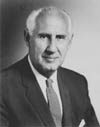
Alan F. Guttmacher, People's Physician
Date
June 18, 2000
Author

Alan Guttmacher, 1898 – 1974 Source: The Alan Guttmacher Institute
In this Series
- Alfred Lotka, Mathematical Demographer
- Margaret Sanger, Birth Control Pioneer
- Alan F. Guttmacher, People’s Physician
- Gregory Pincus, Father of the Pill
- John D. Rockefeller 3rd, Statesman and Founder of the Population Council
- Reimert T. Ravenholt, USAID’s Population Program Stalwart
- Nafis Sadik, Architect of ICPD
This is the third in a series of profiles of the people who have most influenced thinking about population over the past century. The profiles bring you the insights of contemporary population specialists on the contributions of their predecessors and contemporaries.
(2000) Although Alan F. Guttmacher spent his professional life as a physician specializing in obstetrics and gynecology, and later in family planning, he was foremost a humanist, driven by a belief in the immense social value of medicine. Twenty-five years after his death, Alan Guttmacher is well-remembered for his teaching, his leadership in the early birth control movement, and his social consciousness.
Early in his career, as an obstetrician at The Johns Hopkins Hospital in Baltimore, Guttmacher noted a disparity in fertility rates among his patients of differing socioeconomic status. He realized that women without access to private physicians also lacked access to contraceptive information and services. Guttmacher joined the birth control movement and began to promote family planning, which he considered “an urgent, democratic form of medicine.”
In 1933, Guttmacher published the first of a series of books for lay people. These books served to educate several generations of women — first about pregnancy and delivery and later about contraception, abortion, and infertility — at a time when reproductive anatomy and physiology were solely the domain of the physician. His works displeased many of his colleagues, who found it professionally disreputable for a doctor to write for a lay audience.
In 1952, Guttmacher moved from Baltimore to New York to become director of obstetrics and gynecology at Mount Sinai Hospital.
In New York, Guttmacher attempted to introduce contraceptives into municipal hospitals, which provided the majority of medical services to low-income women. He was unsuccessful, however, and discovered that a heavy-handed, but unwritten, policy prohibited physicians at municipal hospitals from providing contraceptive services or referring women elsewhere for services. The commissioner of hospitals, appointed by the mayor, asserted that birth control was not the responsibility of a city hospital and declared the issue untouchable; the health department claimed no jurisdiction in matters related to contraceptives.
Guttmacher and several colleagues led a campaign to overturn the ban. The New York Post, which exposed the ban and reported on the campaign, ran this statement by Guttmacher in July 1958: “New Yorkers who can afford the services of a private physician or private hospital have no difficulty in obtaining competent instruction in contraception. I wish to speak on behalf of the thousands of women who are discriminated against in our great municipal hospitals by this prohibition. Must this type of backward medicine be perpetuated?”
The campaign not only succeeded in New York City, but also laid the groundwork for the provision of family planning services by public health agencies throughout the country in the 1960s and later for the establishment of the Title X program.
In 1962, Guttmacher became president of the Planned Parenthood Federation of America, a position he held until his death.
In the late 1960s, as congressional interest in establishing national and international family planning programs grew, Guttmacher saw the need to provide data for the development of policy. In 1968, he founded the Center for Family Planning Program Development, a division of Planned Parenthood. After his death, the center was renamed The Alan Guttmacher Institute. Guttmacher changed the way physicians and the public thought about access to contraceptives. He helped legitimize family planning in medical education and clinical services.
Allan Rosenfield, M.D., is dean of the Joseph L. Mailman School of Public Health at Columbia University. Emily Figdor, a research assistant to Dr. Rosenfield, is completing her master’s degree in public health.
For More Information
Publications by and about Alan Guttmacher include the following:
William Berkowitz, Conversation with … (New York: Bloch Publishing Company, 1975).
Alan F. Guttmacher, Babies by Choice or by Chance (Garden City, New York: Doubleday and Company, 1959).
— — — — , The Complete Book of Birth Control (New York: Ballantine Books, 1961).
— — — — , Life in the Making (New York: The Viking Press, 1933).
— — — — , Pregnancy and Birth: A Book for Expectant Parents (New York: Viking Press, 1957).
— — — — , with Winfield Best and Frederick S. Jaffe, Planning Your Family: The Complete Guide to Birth Control, Overcoming Infertility, and Sterilization-With a Special Section on Abortion (New York: Macmillan, 1964).
Alan F. Guttmacher, Winfield Best, and Frederick S. Jaffe, Birth Control and Love 2ed. (London: Macmillan, 1969).
Alan F. Guttmacher and Joan Gould, Why Can’t You Have a Baby? (New York: Public Affairs Committee, 1960).
Alan F. Guttmacher and Joan Gould, New Facts About Birth Control (New York: Public Affairs Committee, 1959).
Frederick S. Jaffe, “Alan F. Guttmacher,” Family Planning Perspectives 6, no. 1 (1974): 1-2.
Joseph J. Rovinsky, “In Memoriam,” Mt. Sinai Journal of Medicine 41, no. 4 (1974): 503-504.
Benjamin Viel, “Dr. Alan F. Guttmacher: As Remembered by a Latin American Physician,” Mt. Sinai Journal of Medicine 42, no. 4 (1975): 335-336.
Alden Whitman, “Alan Guttmacher, Pioneer in Family Planning, Dies,” The New York Times Biographical Edition, March 1974: 356-357.
Articles in This Series
- Alfred Lotka, Mathematical Demographer
- Margaret Sanger, Birth Control Pioneer
- Alan F. Guttmacher, People’s Physician
- Gregory Pincus, Father of the Pill
- John D. Rockefeller 3rd, Statesman and Founder of the Population Council
- Reimert T. Ravenholt, USAID’s Population Program Stalwart
- Nafis Sadik, Architect of ICPD
